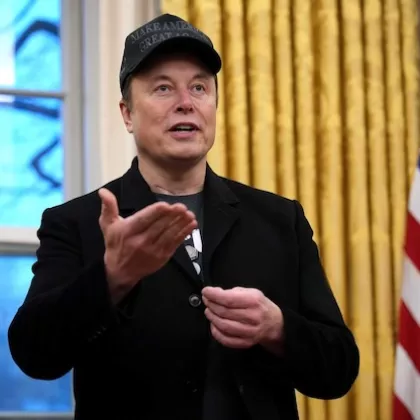Making entrepreneurial ventures successful

Making entrepreneurial ventures successful
February 14, 2023 | By Dean Sevin Yeltekin
A Fulbright scholar who is as comfortable in a fast-food management setting as he is in a classroom, Dennis Kessler brings a unique blend of academic and practical knowledge to Simon Business School. Since he joined our faculty in 2004, he has played an integral role in cultivating an environment that supports entrepreneurship, both on and off campus.
In the Q&A below, he shares more about his mission to equip entrepreneurs with the tools they need to succeed.
What is one of the first lessons you learned about entrepreneurship and innovation?
Focus on filling a customer void. I initially moved to Rochester to go into business with my brother. Together we ran Burger King, Del Taco, and Friendly’s franchises in upstate New York—about 70 restaurants employing close to 3,000 people. In 1993, there was a nonprofit organization in Watkins Glen called the Farm Sanctuary that was looking for a place to send busloads of students for lunch after visiting. The problem was that they wanted a vegetarian option, and I was a franchise owner with limited options. When I discovered there was a Burger King location in London, UK, that served a vegetarian burger, I pushed and pushed until I got the corporate team to agree to let me introduce it in at our restaurant in Watkins Glen. We lost about $0.75 a burger, since they had to be shipped from Ireland, but it was worth it to satisfy customer demand. Because of the visiting students, we had enough volume to make it work. That’s how the first vegetarian burger sold in a U.S. fast food restaurant came to exist, and Burger King still has one today. It’s about filling the void in the market wherever you see one.
What is your approach to teaching entrepreneurship and innovation?
I like to start each class with a business problem from my own experience and walk around the room calling on students to offer an opinion. The goal is to continually plant new thoughts and ideas in their minds. Then, through working on business plans in teams, students begin to learn that real entrepreneurship is not just about good ideas—it's about risk mitigation. They have to have some tolerance for failure and risk to succeed, but it’s not about throwing caution to the wind. They learn about customer discovery, focus groups, and all these other tools we have
developed for testing an idea.
What role does an entrepreneurial ecosystem play in an entrepreneur’s success?
What entrepreneurs need to understand and organize their next steps are ecosystems of collaborators. They need someone to affirm the value of an initial idea and ask the hard follow-up questions: “Who will own the majority of your company?” “What is the legal structure?” “Who is taking ownership of what?” “How much capital do you need?” The most effective ecosystems help budding entrepreneurs figure out what they don’t know and point them to
people who can offer everything from technical and legal advice to seed funding when an idea is fully formed.
How would you characterize the entrepreneurial ecosystem at the University of Rochester—and, by extension, the Greater Rochester Area?
When I joined the faculty at Simon back in 2004, few resources existed for entrepreneurs in our university ecosystem. Now, anyone with a good idea can go to the Ain Center for Entrepreneurship and Innovation to connect with programs and resources that help them flesh out their ideas and make connections. Then the Ain Center will send them to NextCorp, an incubator that connects entrepreneurs to subject matter experts in technology, manufacturing, and other fields. When it comes time to secure funding, Excell Partners—a venture capital firm and subsidiary of the University—is the next stop. The University of Rochester is building a strong network of entrepreneurs in a region that already has a lot to offer. It is one of 17 universities in the upstate area, adding to an already high intellectual quotient. The citizens of Greater Rochester are highly engaged, the cost of living is much lower than in major tech hubs, and the quality of life is high. I often encourage people to start a business here, where the ecosystem is small enough for them to get noticed and large enough to help them raise the funds they need.
What are some ways you are working to expand the opportunities available to entrepreneurs at the University?
There are abundant resources available to entrepreneurs at the University of Rochester, but I would like to see them stitched together more seamlessly. Ideally, we will create a more defined path for entrepreneurs to take, so that from the moment of intake, they know exactly where to go for accounting help, manufacturing support, legal advice, funding, and more. I am also part of the effort to facilitate more cross-coordination between schools, particularly
business, engineering, and medicine. Recently, we hosted a conference with representatives from multiple schools to give them the opportunity to hear what everyone else has been working on. We need to do more of that in order to build better pipelines and systems.
What is one piece of advice you offer to aspiring entrepreneurs?
When it comes to identifying a winning business idea, there are three major zones of opportunity: changing technology, changing laws, and changing societal mores. I often hold up a smartphone and tell students that if they can’t use it to solve a problem, go back to the drawing board. That’s the first element. Changing laws around things like marijuana usage, for example, also presents opportunities to innovate and solve market problems where no opportunities existed before. Changing mores do the same thing. With women nearing parity with men in the workforce, for example, the need for more high-quality, affordable childcare options is greater than ever before.
Once an entrepreneur has an idea, I tell them to plug into entrepreneurial ecosystems as soon as possible to put the pieces together. They don't need to understand every element needed to bring an idea to market right off the bat. There is always help available to those willing to take a risk.
This blog is Part 2 in a series about entrepreneurship and innovation. Click here to read Part 1.

Dennis Kessler, S.J.D., is the Edward & Agnes Ackley Clinical Professor and Director of
Entrepreneurship at Simon Business School.
Follow the Dean’s Corner blog for more expert commentary on timely topics in business, economics, policy, and management education. To view other blogs in this series, visit the Dean's Corner Main Page.











